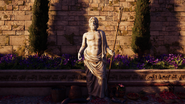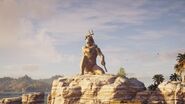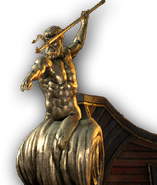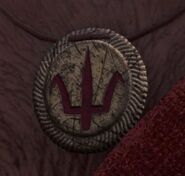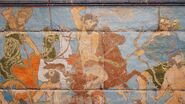
|
Patience, brothers. Soon we will reveal the secrets of Assassin's Creed: Odyssey – The Fate of Atlantis. This article has been identified as being out of date. Please update the article to reflect recent releases and then remove this template once done. |

|
Ezio, my friend! How may I be of service? This article is in desperate need of a revamp. Please improve it in any way necessary in order for it to achieve a higher standard of quality in accordance with our Manual of Style. |
- "Poseidon, god of the ocean. Thank you for watching over the Adrestia."
- ―Kassandra[src]
Poseidon was an Isu, the Trident King and Dikastes Basileus of Atlantis. He was the brother of Hades and Zeus, and fathered ten sons: Atlas, Diaprepes, Mestor, Azaes, Ampheres, Gadiros, Elasippos, Mneseas, Evaimon, and Autochthonos. He serves as the main antagonist of Assassin's Creed: Odyssey: Fate of Atlantis.
Atlantis was first ruled by Atlas but Poseidon, seeking power for himself, actually supplanted his own son as the reigning monarch and instead gave all his children the subordinate position of Archon to manage the city's affairs.
Poseidon was revered by the ancient Greeks as the god of the seas, the ocean, horses, and earthquakes. His equivalent in Roman mythology is Neptune.
Biography
During the Isu Era, Poseidon ruled the Isu city of Atlantis, where he was known as the Dikastes Basileus. Appaled by the scientific experiments conducted on humans, Poseidon outlawed it in his city.[1]
Influence and legacy
Classical antiquity
During the Peloponnesian War, the Spartan misthios Kassandra obtained Poseidon's Trident from within the ruins of a temple dedicated to him on a small Samian island. This trident was a weapon attributed to Poseidon that allowed the wielder to breathe underwater and was said to "control the seas".[2]
The Areopagus in Athens was said to have been the place where the god of war Ares was judged for killing one of Poseidon's sons.[3]
Throughout the Greek world, there were numerous temples dedicated to the god, and some like the Erechtheion on the Akropolis Sanctuary in Athens was dedicated many gods at the same time. There was also the region of Korinthia dedicated to Poseidon: the Isthmus of Poseidon, housing the Sanctuary of Isthmia, home to the Isthmian Games.[2] Lesser shrines and altars, like Kolonos Hippios in Attika, also dotted the landscape.[4]
After imbibing lotus flower wine, Barnabas had three visions concerning his wife Leda. In one of these, he swore that Poseidon, along with Thoosa, held his hand as they guided him down to the depths of Drakontospilo on Anaphi.[5]
In 48 BCE, Poseidon was often invoked by Phoxidas during his time sailing the seas with Aya.[6]
Mythology
According to the story of the death of Hippolytos, the hero Theseus' son, Poseidon played a part in it. Angered by what his wife Phaidra claimed Hippolytos to have done, Theseus invoked the god to kill Hippolytos. Poseidon summoned a sea monster, and Hippolytos died within the Sinkholes of Herakles in Argolis, in a chariot accident.[7]
Poseidon was rumored to have fathered Byzas with the nymph Keroessa. Byzas later became the founder of Byzantium, which was renamed sometime after as Constantinople.[8] While Amphitrite, wife of Poseidon and queen of the sea, was said to have birthed his other son Triton, who had a conch shell to control the sea.[9] Poseidon is also named as the father of the legendary horse Areion.[10]
According to stories told on Naxos Island, a mortal woman by the name of Iphimedeia fell in love with Poseidon, and was in the habit of walking the shores, gathering sea water into her lap. Later, she gave birth to twin giant sons, the Aloadai Otos and Ephialtes.[11]
Orion the Giant was also a son of Poseidon, allegedly born in Boeotia.[12]
Simulation
During the Peloponnesian War, a simulated version of Poseidon was created by Aletheia within her simulations intended for the Spartan misthios Kassandra..[13]
Trivia
- According to the myths, the Titan Kronos devoured every child he begat with his sister-wife Rhea. When Zeus saved his siblings, they accompanied him as the new gods, and became part of the twelve mightiest. In order from oldest to youngest, the children were Hestia, Demeter, Hera, Hades and Poseidon before Zeus.
- The mural depicting Poseidon in Assassin's Creed: Odyssey is based on a painting on an amphora from Late Classical period, depicting the Battle of the Giants and Gods.
- According to The Art of Assassin's Creed: Odyssey, the amulet worn by Barnabas and Mydon for example is that of Poseidon, featuring his trident.
Gallery
Appearances
- Assassin's Creed: Revelations (mentioned in Database entry only)
- Assassin's Creed: Origins (mentioned only)
- Assassin's Creed: Odyssey (Statue only)
- Fields of Elysium (mentioned only)
- Torment of Hades (simulation only)
- Judgment of Atlantis (simulation only)
References
- ↑ Assassin's Creed: Odyssey – The Fate of Atlantis: Judgment of Atlantis
- ↑ 2.0 2.1 Assassin's Creed: Odyssey
- ↑ Assassin's Creed: Odyssey – Attika: Areopagus
- ↑ Assassin's Creed: Odyssey – Attika: Kolonos Hippios
- ↑ Assassin's Creed: Odyssey – Odyssey Into the Past
- ↑ Assassin's Creed: Origins – Ambush At Sea
- ↑ Assassin's Creed: Odyssey – Argolis: Chariot of Hippolytos
- ↑ Assassin's Creed: Revelations – Database: Constantinople
- ↑ Assassin's Creed: Odyssey – She Who Controls the Seas
- ↑ Assassin's Creed: Odyssey – Arkadia: Statue of Fury Demeter
- ↑ Assassin's Creed: Odyssey – Naxos: Cave of Iphimedeia
- ↑ Assassin's Creed: Odyssey – Boeotia: Tomb of Orion
- ↑ Assassin's Creed: Odyssey – The Fate of Atlantis: Torment of Hades
| ||||||||||||||||||||||||||||||||||||||||||||||||||||||||||||||||||

